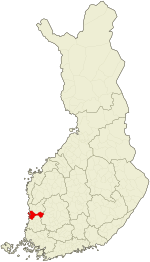Pori
|
Pori Pori – Björneborg |
||
|---|---|---|
| City | ||
| Porin kaupunki Björneborg stad | ||

The old Town Hall of Pori
|
||
|
||
 Location of Pori in Finland |
||
| Coordinates: 61°29′N 021°48′E / 61.483°N 21.800°ECoordinates: 61°29′N 021°48′E / 61.483°N 21.800°E | ||
| Country |
|
|
| Region | Satakunta | |
| Sub-region | Pori sub-region | |
| Charter | 1558 | |
| Government | ||
| • City manager | Aino-Maija Luukkonen | |
| Area (2016-01-01) | ||
| • Total | 1,155.67 km2 (446.21 sq mi) | |
| • Land | 834.06 km2 (322.03 sq mi) | |
| • Water | 870.01 km2 (335.91 sq mi) | |
| Area rank | 64th largest in Finland | |
| Population (2016-03-31) | ||
| • Total | 85,256 | |
| • Rank | 11th largest in Finland | |
| • Density | 102.22/km2 (264.7/sq mi) | |
| Population by native language | ||
| • Finnish | 98% (official) | |
| • Swedish | 0.5% | |
| • Others | 1.5% | |
| Population by age | ||
| • 0 to 14 | 15% | |
| • 15 to 64 | 65.2% | |
| • 65 or older | 19.8% | |
| Time zone | EET (UTC+2) | |
| • Summer (DST) | EEST (UTC+3) | |
| Municipal tax rate | 18.75% | |
| Climate | Dfc | |
| Website | www.pori.fi | |
Pori (Swedish: Björneborg, Latin: Arctopolis) is a city and municipality on the west coast of Finland. The city is located some 10 kilometres (6 mi) from the Gulf of Bothnia, on the estuary of the Kokemäenjoki river. Pori was established in 1558 by Duke John who became later John III of Sweden.
The municipality has a population of 85,256 (31 March 2016) and covers an area of 1,155.67 square kilometres (446.21 sq mi) of which 870.01 km2 (335.91 sq mi) is water. The population density is 102.22/km2 (264.7/sq mi). The municipality is unilingually Finnish. It is the 11th largest city in Finland, and the 7th largest urban area. Pori is also the capital of the Satakunta region (pop. 224,028) and the Pori sub-region (pop. 136,905).
The name Pori comes from the -borg part (meaning city or castle) of the original name in Swedish with a Fennicised pronunciation. The Swedish name Björneborg means Bear City (Bear Castle), and the Latin-Greek Arctopolis also means Bear City.
City of Pori was established in 1558 by Duke John of Finland (Finnish: Juhana III or Juhana-herttua) who was later known as John III of Sweden. It was a successor to the medieval towns of Teljä (Kokemäki) and Ulvila. Sailing the Kokemäki river had become more and more difficult since the 14th century due to the post-glacial rebound. The importance of Kokemäki and Ulvila began to decline as the ships could no longer navigate the river. In the 16th century the situation had become so bad that Duke John decided to establish a new harbour and market town closer to the sea.
...
Wikipedia

